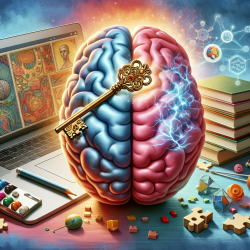Introduction
As a Special Education Director, one of my primary responsibilities is to ensure that every student receives the support they need to succeed academically. The research article titled Learning Difficulties and Working Memory Deficits among Primary School Students in Jakarta, Indonesia sheds light on a crucial aspect of learning that often goes unnoticed: working memory. This blog aims to help practitioners improve their skills by implementing the outcomes of this research or by encouraging further exploration into this vital area.
Understanding the Research
The study conducted in Jakarta found that 13.7% of primary school students had learning difficulties, with 8.04% also experiencing working memory deficits. These findings highlight the significant role working memory plays in learning, suggesting that deficits in this area can severely impact a child's educational success.
Working memory is the ability to hold and manipulate information over short periods, essential for tasks such as following instructions, solving problems, and processing information. It is a critical component of executive functioning, influencing a child's ability to learn and perform academically.
Practical Implications for Practitioners
For practitioners, understanding the connection between working memory and learning difficulties is crucial. Here are some strategies to consider:
- Early Assessment: Implement assessments for working memory in students showing signs of learning difficulties. Identifying these deficits early can lead to timely interventions.
- Targeted Interventions: Develop interventions that specifically target working memory skills. Activities such as memory games, puzzles, and exercises that require students to follow multi-step instructions can be beneficial.
- Collaborative Approach: Work closely with teachers, parents, and other professionals to create a supportive learning environment. Sharing insights and strategies can help reinforce the skills taught during therapy sessions.
Encouraging Further Research
The findings from Jakarta provide a foundation for further research into the relationship between working memory and learning difficulties. Practitioners are encouraged to explore this area by:
- Conducting Local Studies: Investigate the prevalence and impact of working memory deficits in different regions or populations to understand cultural or environmental influences.
- Exploring Intervention Efficacy: Research the effectiveness of various interventions and adapt them to suit the needs of diverse student populations.
- Collaborating with Researchers: Partner with academic institutions to contribute to the growing body of knowledge on this topic, ensuring that findings are translated into practical applications.
Conclusion
Working memory deficits are a significant factor in learning difficulties, and addressing them can lead to improved educational outcomes for students. By implementing targeted assessments and interventions, practitioners can make a meaningful difference in the lives of children struggling with these challenges.
To read the original research paper, please follow this link: Learning Difficulties and Working Memory Deficits among Primary School Students in Jakarta, Indonesia.










